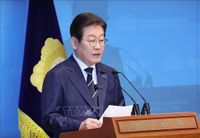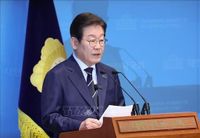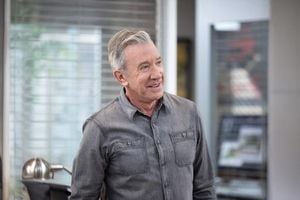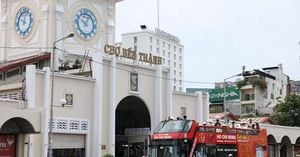In a significant development in South Korea's political landscape, Lee Jae Myung, the candidate from the Democratic Party (DP), has officially registered to run in the upcoming presidential election. This announcement comes as the National Election Commission of South Korea revealed that a total of six candidates have now entered the race, including Lee Jun Seok from the New Reform Party, Kwon Young Guk of the Labor Democratic Party, Koo Joo from the Freedom Unification Party, and independent candidates Song Jin Ho and Hwang Kyo Ahn.
Lee Jae Myung and Lee Jun Seok both completed their registration on May 10, 2025, solidifying their positions as the contenders for the presidency. Lee Jae Myung, who previously served as the leader of the DP, is currently leading in the polls and is widely regarded as the frontrunner for the presidency in the upcoming election.
Adding to the intrigue of the race, former Prime Minister Han Duck Soo has also made headlines by joining the ruling People Power Party (PPP) on May 9, 2025. His move is seen as a strategic play to potentially replace Kim Moon Soo as the party's new candidate. Han's entry into the race has sparked discussions about his potential impact on the election, with many viewing him as a game-changer.
On the evening of May 10, 2025, Han and Kim Moon Soo met for the third time to discuss the possibility of candidate unification. However, reports indicate that no agreement was reached during their discussions, leaving the dynamics of the PPP's candidacy uncertain.
The deadline for presidential candidates to register with the National Election Commission is set for May 11, 2025, creating a sense of urgency among those still considering their options. As the election date approaches, the political atmosphere is charged with anticipation, and all eyes are on the candidates as they prepare for what promises to be a highly competitive election.
Lee Jae Myung's candidacy is particularly noteworthy given his previous leadership role within the DP. His popularity in the polls suggests a strong base of support as he campaigns for the presidency. Analysts are closely monitoring the developments within the DP as they assess Lee's chances against his opponents.
Meanwhile, Lee Jun Seok's entry into the race through the New Reform Party adds another layer of complexity to the election. His platform and policies will be scrutinized as voters seek to understand how he plans to differentiate himself from Lee Jae Myung and the other candidates.
The Labor Democratic Party, represented by Kwon Young Guk, is also making its presence felt in the race. Kwon's campaign will likely focus on key issues affecting the working class, aiming to attract voters who prioritize labor rights and social justice.
In addition, Koo Joo of the Freedom Unification Party is expected to address national security and unification issues, tapping into the concerns of voters who prioritize a strong stance on these matters.
Independent candidates Song Jin Ho and Hwang Kyo Ahn may appeal to voters seeking alternatives to the traditional party structure. Their campaigns could resonate with those disillusioned by the existing political landscape, potentially drawing in a significant voter base.
As the election date nears, the candidates will engage in debates and public forums, providing voters with opportunities to hear directly from them about their visions for South Korea's future. The stakes are high, and the outcome of this election could shape the nation's policies and direction for years to come.
In conclusion, the upcoming presidential election in South Korea is shaping up to be a pivotal moment in the country's political history. With a diverse array of candidates, each bringing unique perspectives and policies to the table, voters will have the chance to weigh their options carefully. As the deadline for registration approaches, the political landscape remains dynamic, and the anticipation for the election continues to build.





